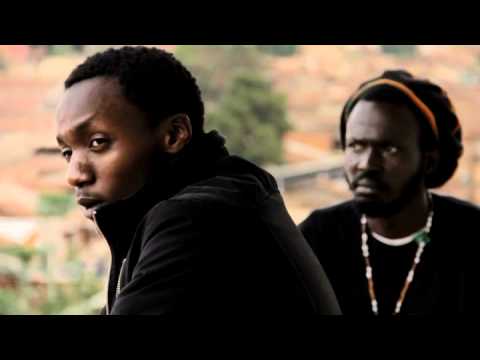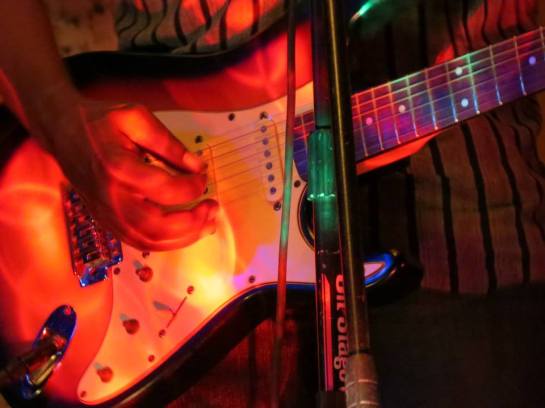
Arnold Aganze, on set
Arnold Aganze Bagalwa is a budding film-maker originally from Democratic Republic of Congo. In active combat from the age of 13 until a few years ago, he has not had the usual upbringing we expect of film-makers. He has been living in Uganda recently and has finally managed to get started on his dream career, with a grant and training from Maisha Film Lab, Kampala. While living in Jinja, he met a crew of rastas and identified with them as soul-mates. He chose to depict their philosophy and their world-view in his first film, an unusual new documentary called ‘Rastasophical Mood’, which gets its premiere screening at Tilapia, Thursday 8th August at 8pm.
Here we talk to Arnold about the film and his troubled path to the present moment. (Photos here are all from the film shoot)
What was the inspiration behind the film?
This film reflects my experience as a Congolese in Uganda, as a stranger. I discovered the rastas were the people I could identify with most easily. The first I met were a group called ‘matoke’ near Jinja. Everyone disses rasta as smokers, but for me these guys were super positive.

What do you say to people who dismiss rasta as mere bayaye [idlers]?
In my film, Ras Nesta explains how they get by in society. Nesta is a [music] producer with a family, he looks after them, he feeds them and so on. These guys work, they do IT jobs, they have grand plans. This is true, I saw all this! They have great projects. For example, look at Blessed Son. He sings to educate the kids, he sees his music as transmitting a positive message, to make a positive social transformation. These people are not only for smoking!
Everyone in my film is like that.
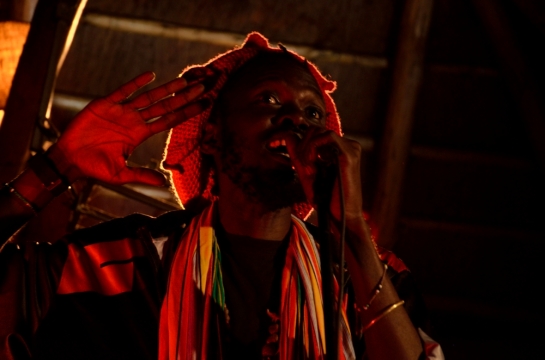
Blessed Son, lead singer of Urban Chillaz
What are the politics of rasta?
People are ignorant of rasta, but they are the people who keep the real African spirit going. They are genuinely maintaining community connections and a real social life. If you approach them you feel positivity. All they think about is One Love, and peace, and bringing people together, to be together, to sing together. They can make our hearts beat together, and with their reggae music, our hearts beat at the same time.
Rastas, of course, are human beings. I don’t idolize them, but the subculture they represent is very important for us Africans. It was made by us and for us, it goes beyond nation, tribe, economics. It is something truly African that has influenced the world, just like Buddhism, yoga or Christianity have influenced the world… And more than this, it is a culture that is free and moving with its time, yet, the essence of it is roots, the nature and the positive vibration where everything comes from. Something like that…

Ife Piankhi, poet, singer, events manager and mother of four
Do you think rastas have a problem integrating themselves with society, or do they not care?
It’s not easy to bring people together in Africa to hear your real story. Most people can’t believe that someone who has been smoking weed for 20 years has anything to say. But at minimum, they communicate with music and I want to show people how they can contribute to society. These guys actually spread a true African spirit that you can’t find in university and school.
OK, so there are some lazy rastas who won’t work, but that’s true everywhere, on every level of society – there are lazy people. And, on the other hand, now you see many people wearing dreads like a rasta – that’s now a fashion, so what does that say??
It’s time for us to talk the reality about our African culture and the only place to find that is in rastaman. Everywhere in the world there is good and bad. Smoke doesn’t make you violent. It makes you connect with others. You can talk freely, in a humble way, and in a philosophical mood.
Me, a former child soldier looking for my people, these were the people I found. I did not find my people in an NGO!
Actually people’s view is starting to change, and that is why I think rastas are important today. We have more corruption, corruption of the mind and the soul also. Christianity has unrooted us in a way. Africans have a hard time with modernity, and rasta culture offers a sincere alternative if we can get out of our own moulds.
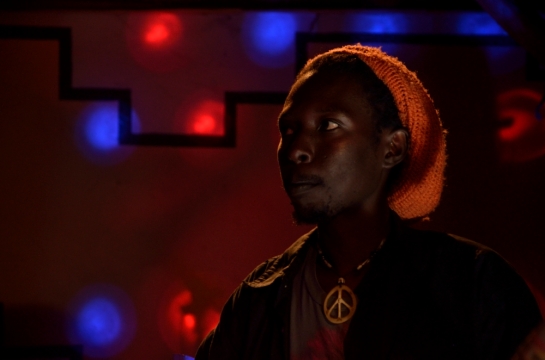
What got you into film?
My whole life has been like an action film. Since the age of 13, I was in an action film, in real life, where you can die by bullets. My life was the same as James Bond or Schwarzenegger. But, if I really want to talk about my story, my Africa, I can’t take it as a fiction film. It was real.
I’m interested in the influence of film. In how people are influenced by film. People imitate everything they see in film. They can dress and even kill and die like the people they see in films.
I was born in a village without power, no TV. When I went in the army, we were in another village, and there I saw a film of Schwarzenegger. Then, when I was out of the army for 2 years I dreamed about Schwarzenegger a lot. But they told me he is now doing politics, not film. So I went to study political science, so I could go and meet Schwarzenegger. When I fought in the army I used to fight like Schwarzenegger. My name in the army was John, but I changed my name to Arnold. This is my motivation.
The film was Commando, I think, the one where he rescues some children. I forget, it was a long time ago…
I used to want to be an actor, and I wanted to go to Hollywood. But then I talked to a good friend of mine, and he made me understand that the time is now, and that there are actually much more opportunities here [in Africa]. Everything is cheaper, you can make things happen with a very small budget. I started as a writer, and so I turned to script writing and now directing.

Aganze checking shots with cameraman Moses Bwayo
So how was it, making this rasta film? Was it your 1st film?
This is my 1st film. I am also writing a feature – Aganze – about my life. This is something very important because no-one else can tell an African story like this, like me. I was not ready to talk about myself, but by the end I realise that no-one can talk about my story better than me. The documentary was also hard because it was my 1st film and I had to write, act and direct. Rastasophical Mood.
It is a documentary but it does not fit into any genre. Let me say this is ‘new wave’. New style, new way of making things. This is a new way to make movies.
Making films with rasta while being supervised by Maisha [the film-funders] was not so easy. Even the first day I asked the mentor not to come with us because I knew Blessed would change all the plans and we would have to go with the flow… That is what is a rasta film, you have to catch the natural mystic, you have to be in touch with the rasta vibration and make it come to life… So lots of improvisation, but also many good suprises!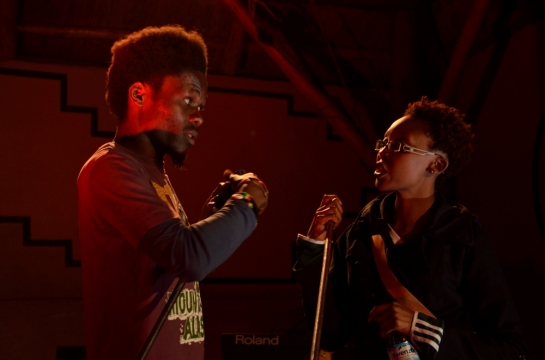
What’s your background, your training, to make this film?
I like to train myself. Do I really need to study if I can think? Film is imagination, how to realise our ideas. That’s something I was doing before anyway. But I never participated in any film before. I was so shy, but I have transformed myself. I have downloaded information on film-making and read books. I had no money for film school, I have to train myself. Now I believe I have trained myself, well.
The friend, Derek, who told me about making films here rather than going to Hollywood, he helped me push my ideas. Not like a mentor, but more like a close friend with whom you share everything, but nobody is high or low. We push together and influence each other. He also learned in the same way, and he’s still learning, so we really push together…

And influences? Name some films that influenced you, apart from Schwarzenegger.
Mainly comedies: ‘Fired Up’; ‘Harold & Kumar Escape From Guantanamo Bay’. I spend my time trying to understand what’s in America – what’s the message in the film – is it brainwashing?
Harold and Kumar has an amazing story with very funny ideas, and I could identify with the shyness of the characters. And I’m interested in films about black Americans. I’m curious about what’s going on with American women. There is an energy difference.
I like action and drama but mainly I like hearing what the characters are talking about. I am also interested in magic, I was a magic man in the army, and I want to see how they treat magic in film, like Harry Potter.
Also I’m very interested in early black and white films, because I want to see the beginnings of film.
I always watch films. In fact when I work, I always have a film playing on one half of my screen and am doing my work on the other half. Splitting my brain…
But I would like to say: in film, there’s nothing as hard as seeing yourself on screen! That is the hardest part.
I know cinema has a great history, every country has their classics, but of course growing up in a village in Congo I never had access to much. It’s really lacking in my life, but sometimes I consider it a good thing, like reading literature classics after you write your own book. You can be free. But also very innocent, I can say, so I know my view is probably not so high as what has already been done, but hopefully it can be original and with a real Congolese touch.

Rastasophical Mood screens Thursday 8th August, from 8pm, at Tilapia.
Arnold and some of the rastas featured in the movie will be present to answer questions and share their ideas.

